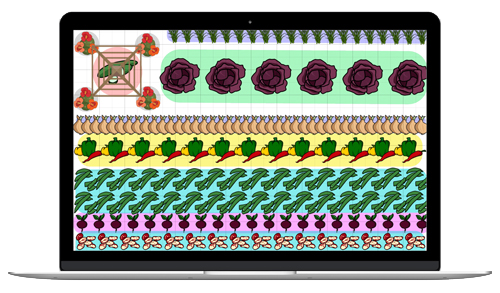The Almanac Garden Planner - Use It Free for 7 Days!
Plan your 2025 garden with our award-winning Garden Planner.
Reuse and recycle your plant pots and containers with these smart ideas!
6 Ingenious Ways to Reuse Your Plant Pots
Reusing plastic plant pots in the garden is not only environmentally friendly, it can save you money, make some gardening tasks easier, and even help to make your garden more beautiful.
In this short video, we demonstrate six ingenious and easy-to-follow ways to breathe new life into your old pots.
1. Make a Plant Halo
Plant ‘halo’ reservoirs are great for thirsty tomato plants. Cut the bottom off an old plastic pot, then push the now bottomless pot halfway into the soil. Plant your tomato plant inside. When you water into it, the pot will contain the water so it can gradually soak into the soil directly at the roots.
You can add more potting soil or compost into the halo at planting time too, leaving enough space to water into it. Roots will grow from the buried part of the stem, providing more support and nutrients for the plant.
2. Use a Pot as a Planting Guide
When potting a plant up into a bigger container, first add some potting soil to your new container. Put an empty pot the same size as the original one into the middle of the larger container, and continue to fill around it. Remove the pot to leave a ready-made hole just the right size to plant into!
3. Build a Bug Hotel
Stuff an old plastic pot with pieces of bamboo cane, hollow stems, twigs or corrugated cardboard, or a mixture. Position the bug hotel on its side in a safe, sheltered position, or attach a hook to the pot and hang it from a branch.
4. Make a Twine Dispenser
Put your ball of twine into a plastic pot and feed the end through one of the drainage holes. Stick duct tape over the open end of the pot to prevent the twine from falling out.
5. Get Creative
Give old pots a makeover using non-toxic paints, or by gluing on materials such as burlap, rope, cloth, decorative beads, shells or mosaic pieces to create a beautiful, unique plant pot.
6. Use a Pot as a Harvesting Basket
Use a large pot as a handy harvesting basket that makes it easy to wash your fresh vegetables. Place the vegetables into the pot then rinse them under a tap or hose to get them ready for the kitchen.
If you have any ideas on how to use old pots, please share below!
Get more expert advice and have fun plotting your garden plans with our Almanac Garden Planner! Free trial!
ADVERTISEMENT
Bury old pots or trash cans on their sides two thirds into the ground. They make hidey-holes for pet tortoises, turtles and other critters like lizards that may help your garden.
Hello,
I have had good success growing tomatoes in tires. This year I have done some additional research and I am questioning the safety of using tires. Are tires a safe container for growing vegetables?
Can you plant veggies in a plastic container that was used before w/ flowers ? If ok what do u have to do to the container any certain way to clean them .
Hi Joan,
It’s perfectly fine to plant vegetables in a container that used to have flowers. It’s a good idea to at least rinse out old pots and, if you want to ensure that no diseases are spread from plant to plant, wash them with a bleach-water mix. Add two teaspoons bleach to a gallon of water and wipe down the insides of the pots, letting them air-dry before use.
Plant an aggressive, take-over plant, such as mint, in an empty pot (with or without the bottom) in your landscape or garden and put the pot with plant in the soil. Pot will contain over-growth. Depending on pot size you can control how much of that plant you really want.










